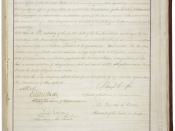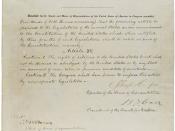The First Amendment states,
"Congress shall make no law respecting an establishment of religion, or prohibiting the free exercise thereof; or abridging the freedom of speech, or of the press; or the right of the people peaceably to assemble, and to petition the Government for a redress of grievance."
There are many historical debates about what our founding fathers wrote in 1791. So many questions have been left unanswered, but there's one fact; there are many advantages and disadvantages that have developed from the First Amendment.
The founders of the United States government tried to protect this liberty by assuring a free press, to gather and publish information without being under control or power of another. So why do we need to be concerned if we, as citizens, have been properly protected under the constitution? Our concerns occur on account of special interest groups that are fighting to change the freedom of expression, the right to freely represent individual thoughts, feelings, and views, in order to protect their families as well as others.
One popular question of the respondent, "Are we protected from censorship under the First Amendment?" In other words, do individuals or groups have the right or the power to examine material and remove or prohibit anything they consider objectionable? This argument has been progressing for centuries; in fact, the first notable case was against John Peter Zenger in 1743. Zenger was an editor of a New York colonial newspaper that often published articles critical of the colonial governor. He successfully argued that publishing the truth should be a defense and therefore defied the conventional wisdom and ended colonial intrusion into freedom of the press. Since that case, the progression through time has expanded matters to the complicated issues we see today.
In my opinion, the...



Additional Information
Refering to the first two paragraphs, perhaps a more in-depth look at what the founding fathers had to deal with in comparison with the newest issues that arise from this amendment including the desire to allow the people to be informed about their government without actually having the said government force a "truth" down their throats.
0 out of 0 people found this comment useful.